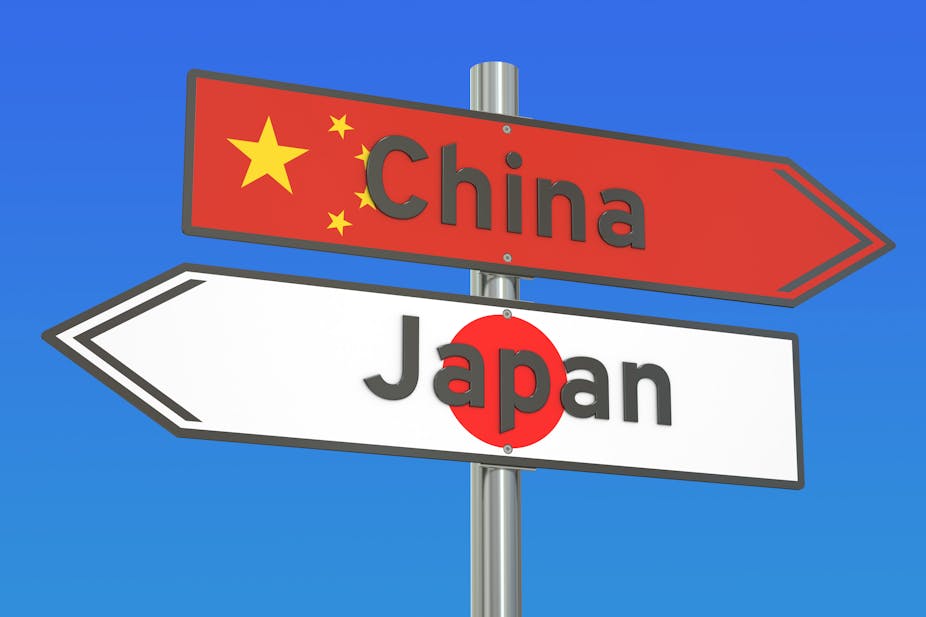Despite occasional reasons to be optimistic, relations between China and Japan have been consistently poor over recent years. This is in part fuelled by China’s rise to the position of second largest economy in the world – overtaking Japan in the process – as well as Japan’s lurch to the right under Prime Minister Abe Shinzo.
Chinese-Japanese rivalry has manifested itself across a range of issues, including disputed territory in the East China Sea, interpretations of wartime history and jockeying to assume the role of regional economic leadership. A new low was reached at the beginning of 2014 when ambassadors of both countries traded public insults likening each other to Harry Potter’s archenemy Lord Voldemort.
Now, this rivalry looks likely to be transplanted into the global arena with Japan hosting the forthcoming 42nd summit of the leaders of the G7, and China hosting its first G20 summit in September. Both countries have diametrically opposed interests in each summit, which will be amplified by their role of host in each respective summit.

At the first meeting of the G7 in November 1975 Japan’s status as a fellow contemporary great power and the sole representative of Asia was recognised. Since then, the membership of the G7 has varied – Canada, the EU and Russia became members, although the latter’s membership was suspended in 2014.
The nature of its agenda has also expanded to include political and security issues, but Japan’s position within this annual gathering of predominantly North American and European leaders has remained secure.
Japan has returned the compliment by seeking to ensure the success of the G7, and argued for its continued and central role in global summitry especially with the rise of the G20 as the more representative and effective centre of global governance.
Poor relation?
Today, the G7 accounts for just over 10% of the world’s population and a third of global GDP. Whereas the G20 includes two-thirds of the world’s population and over 80% of its global GDP. This led former Brazilian president, Lula da Silva, to claim that the G7 had lost its authority.
China has shown little interest in the G7. Instead, it has traditionally placed emphasis on the United Nations as the legitimate centre of global governance – where it occupies a permanent security council seat.
Since 2008 and the first meeting of the G20 leaders in response to the global economic and financial crisis, China has increasingly stressed this grouping over the G7 as the “premier” and more “representative” forum for international economic cooperation.

Japan in contrast has regarded the G20 with ambivalence. An expanded membership is seen by Japan to compromise the group’s effectiveness, but more importantly it dilutes Japan’s great power status, with the newer Asian members (including China, Korea and Indonesia) robbing Japan of its exclusive regional leadership role.
Already China is showing more and more interest in the position Japan promotes among its G7 partners. At last year’s German hosted summit, in a thinly veiled reference to China, the G7 leaders’ statement expressed concern over tensions in the East and South China seas. The reaction in China was predictably critical and already this year Beijing has warned the G7 and Japan from repeating similar statements.
Ties that divide
But things didn’t have to be this way – 2016 could have been a significant year of opportunity for the international community and East Asia in particular. And for a while it did look like things were on the mend between these two great Asian powerhouses – from awkward handshakes at international summits to more constructive discussions earlier this year. Sadly under the new normal of deteriorating Sino-Japanese relations, none of this is likely to materialise this year or any time soon.

This lack of collaboration is a missed opportunity because sound Sino-Japanese relations are central to a lasting regional peace and global stability. A greater synergy between the agendas of the G7 and G20 could have been promoted by Japan and China as hosts, and in turn “G” summitry could have provided a welcome opportunity for China and Japan to cooperate.
By embracing China, the G7 leaders could have discussed the challenges that face the Chinese economy – and by default the global economy – in a more meaningful way, and allowing for a more coherent Asian “group” to be fostered within the G20. Instead, lines have been already been drawn for a potential and wholly unnecessary turf war between these global summits.

